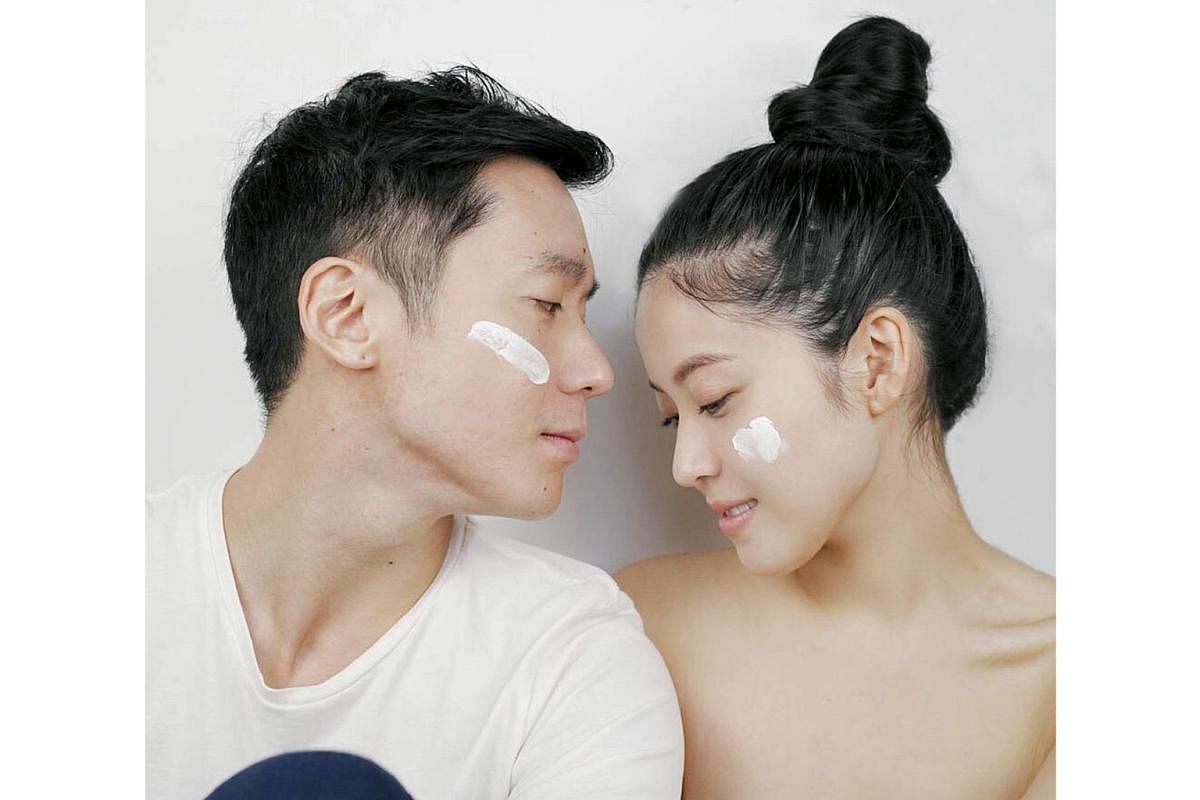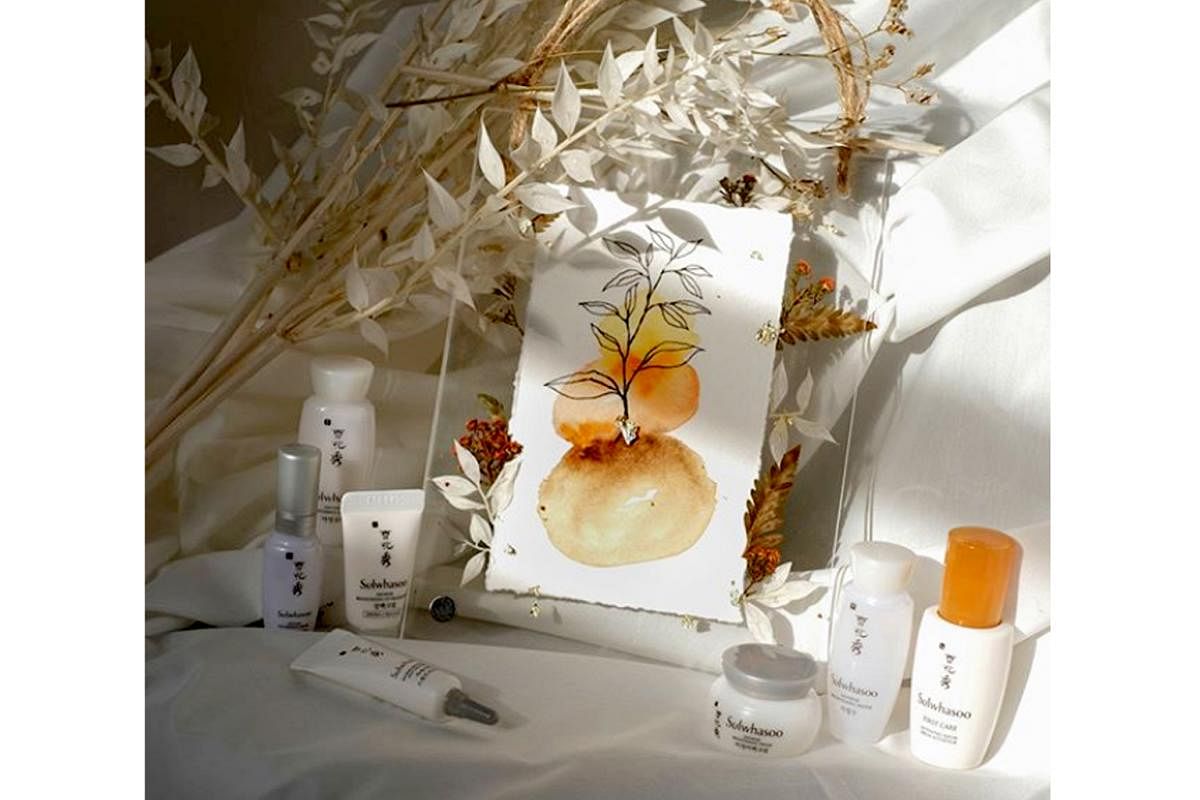Beauty brands get sensitive
Beauty brands are now treading carefully when launching new products in the light of the pandemic





Unknown to them, the founders of skincare brand Zyu, Mr Joshua Tan, 29, and Ms Zoen Tay, 23, were launching their label at the start of a pandemic.
The clean skincare line debuted in late December, when Covid-19 was just starting to surface and make headlines in China.
Their first product launched "before worldwide logistical problems started", says Mr Tan, a full-time actor known for his role in the Ah Boys To Men films (2012 to 2017).
Since then, every move for the brand is made with the pandemic in mind. New launches happened without much fanfare.
It also grew increasingly tough to get foreign ingredients into Singapore, where Zyu's products are manufactured.
"The snowball effect was quite significant - packaging and processes (took longer). Even international delivery had to cease," Mr Tan tells The Straits Times in a teleconferencing interview.
At one point, they were out of stock for almost a month, having prepared a conservative number of products for Zyu's launch.
"It's a horrible feeling when people want to order, but we can't even provide for them. It feels like we're letting them down in a huge way," Mr Tan adds.
For beauty brands, a pandemic means no more glitzy product launches or pop-ups to draw curious new customers. Many have moved events online, though arguably the biggest challenge has been finding a way to replicate the excitement in digital forms.
Launching products is now a juggling act of being sensitive to the global situation, keeping customers intrigued and making savvy decisions for the business.
TAKING THE PERSONAL TOUCH ONLINE
After the early success of a pop-up at youth hangout *Scape in January, Zyu's founders, who are engaged, had planned to hold more pop-ups for subsequent launches this year. But these were scrapped due to the pandemic restrictions.
They ended up doing a Facebook Live event earlier this month to launch their latest product - a five-step facial treatment kit created for the pandemic as an alternative to getting facials in salons.
"It was actually encouraged by my boss Jack Neo," jokes Mr Tan. The film-maker used Facebook Live regularly during the circuit breaker period and had urged them to try it as a marketing tool.
On Mr Tan's Facebook page, he and Ms Tay, a fourth-year medical student, demonstrated how to use the kit step-by-step.
It was a "disorienting" new experience, says Ms Tay, who toggled between English and Mandarin. Her fiance has a mainly Mandarin-speaking fan base.
The live stream reached 1,500 viewers at its peak and the video now has about 95,000 views.
It also gained them a new customer base: Mr Tan's fans.
Calls and queries flooded in, some of which translated into sales, says Ms Tay, who now fields queries daily on a WhatsApp business account.
South Korean beauty conglomerate Amorepacific, too, had to cancel many large-scale physical events planned for the first half of the year.
Product launches for its luxury labels Sulwhasoo and Hera were swiftly moved onto Facebook Live and video-conferencing platform Zoom.
It launched e-lounges in March to facilitate customer queries in place of personal service in stores.
The brands organised online lifestyle workshops such as floral arrangement and painting-some of which incorporated the new products into their activities.
One such product was Sulwhasoo's reformulated signature product, the 5th Generation First Care Activating Serum, a key global launch for the brand this year.
Last weekend, Sulwhasoo held an online botanical watercolour workshop for 40 participants over two sessions.
For $100, participants received watercolour tools and a mini skincare kit including the serum, before joining the workshop via video conferencing.
They were shown how to use the product, and then learnt watercolour painting, taught by a vendor.
BALANCING BUSINESS AND SENSITIVITY
While the brands interviewed agree it is a sensitive time to launch products, timelines, for many, are a tricky thing to negotiate.
From a business perspective, they explain, delaying a product launch - which is planned way in advance - indefinitely could bring problems for inventory and cash flow.
Then there is the matter of honouring timelines with partners. After months of uncertainty, home-grown skincare brand Re:erth is proceeding with its next milestone - opening a standalone counter in Tangs Orchard.
Designed more like a boutique, the counter is due to open early next month and marks the first by a local beauty brand in the department store.
Chief operating officer Toh Ziling, 30, says: "We wanted to honour our deal with Tangs. They're also a local player, so we felt the affinity."
Re:erth had already weathered a cancelled pop-up to launch its newest product at the store in April and an awkward brand debut in the United States, which took place in the week the Black Lives Matter protests started.
"We were very silent on social media and told the US media they don't have to post anything about us," says Ms Toh.
While that remains on pause, the Tangs counter is a long-term investment, she says. The success of previous pop-ups and its physical presence at Design Orchard had shown the brand that a permanent space helps reach out to new and old customers.
At Tangs, there will be a recycling corner, where customers can drop off empty product bottles for points that offset spending on Re:erth products.
The brand works with local waste management company Environmental Solutions Asia, which pioneered a method to convert mixed plastic packaging into reusable non-fossil fuel.
Partnering Tangs has also opened Ms Toh's eyes to the potential of department stores.
Re:erth had launched in 2017 with the intention of being entirely e-commerce based, but she realised "there are many customers who are just looking to experience many brands at once", which department stores offer.
And the concept is timely now.
"Now, to go into individual stores, you have to do SafeEntry check-in each time, even if you already did so to get into the mall," she adds.
"But in a department store, you can explore many different brand concepts in one space."
A spokesman for Tangs confirmed an ongoing revamp of the Tangs Beauty Hall, which had been planned since last year and is expected to be completed in the fourth quarter of this year.
New additions include La Prairie, Gucci Beauty, L'Oreal brand Skinceuticals and French label Chantecaille, which will have its own facial cabine.
Ms Toh adds: "We believe we can bring a new kind of energy into the beauty space.
"Tangs gave us a shot and we're really grateful. It also signals to our customers that 'we're not going to disappear on you'."
New local beauty brands
ZYU SKINCARE
The line, started by 23-year-old medical student Zoen Tay, focuses on clean skincare, made in collaboration with a local beauty spa founded by her parents in 1991.
Ms Tay started her brand after realising many of her peers knew very little about skincare.
She launched a single product - the Antioxidant Night Mask ($89) - last December. Her fiance, actor Joshua Tan, 29, runs the brand with her.
The products are manufactured here, with most ingredients flown in from Japan and Switzerland.
The Glow-It-Yourself Treatment Kit ($279), launched this month, is tailor-made for use at home, but with the same ingredients a professional facialist would use.
The couple were cautious and kept their expectations low for the new brand, but despite the pandemic, it has seen some success with more than 2,000 orders in the first six months. The endorsements from friends in the entertainment industry do not hurt.
"I started this business not wanting to put too much into marketing," says Ms Tay, who plans to release a sunblock next.
"I learnt from my parents' marketing methods, which was word-of-mouth. That way, people trust you."
Available at: zyu.com.sg
PSA SKIN
The sister brand to home-grown Allies of Skin (AOS) has been in the works for two years, says Singaporean founder Nicolas Travis, 32. The brand started research and development for the formulas in 2018, finally launching just before the global lockdowns in end-March.
Conceptualised as "a skincare line for Gen Z", PSA Skin - which stands for Purposeful Skincare by Allies - taps AOS' reputation for simple but effective formulas minus the heftier price tag.
PSA Skin debuted in Sephora Asia with four products, which include a brightening toner, Heroine ($45), that features mandelic and lactic acids; and Goals ($58), a blemish repair serum boasting a blend of acids and probiotics.
Due to Covid-19-related delays, the brand was unable to debut its full range of seven products. But launching PSA Skin has been "the best thing we've done", says Mr Travis. "It allowed us to capture and serve a different customer base - a new, younger demographic we didn't have access to previously because of AOS' high price point. We've been very fortunate to have been able to grow and expand during this tough global climate."
For now, marketing efforts have been kept "very grassroots", with a focus on social media content and paid collaborations with global influencers to spread the word.
"We'll start our global public relations blitz once we launch with our other international retailers like The Hut Group in Britain and the United States; and Cult Beauty and ASOS later this year."
Available at: sephora.sg
JUNG BEAUTY
A year in the making, Jung Beauty is Korean fashion and beauty e-tailer Ksisters' first flagship brand, after four years of curating and distributing indie Korean brands.
It debuted last month with the 2 Step Steaming Hair Spa ($50 for five sheets), a two-step hair mask meant to recreate the salon experience of steaming and nourishing hair.
When pop-ups in March were canned, the brand conducted a consumer test event instead.
Samples were sent to more than one hundred consumer testers who signed up to try the new product, and who were encouraged to share their honest reviews.
Founder Jungmin Lee, 33, says: "We received so much user-generated content and great verbatim feedback about the product."
About 5,000 boxes were sold in the first four days of its launch.
Ms Lee had considered delaying the launch till next year, but felt now was "the right time".
Salon trips might be a luxury for some and she could bring it affordably and safely to consumers' homes instead.
"It's a difficult and unstable time for everyone. We took into consideration the poor economic situation and how this may affect consumers' willingness to try new products," she says.
"But we felt our products would be appreciated during this time for its convenience and comfort, which may in turn help improve the stay-home experience."
Jung Beauty will eventually launch skincare as well, with one to three new products each year.
Available at: ksisters.sg
Join ST's Telegram channel and get the latest breaking news delivered to you.
A version of this article appeared in the print edition of The Straits Times on July 24, 2020, with the headline Beauty brands get sensitive . Subscribe

